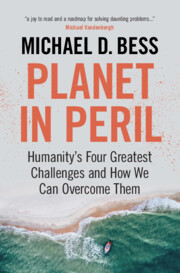Book contents
- Planet in Peril
- Reviews
- Planet in Peril
- Copyright page
- Dedication
- Epigraph
- Contents
- Fictional Vignettes
- Acknowledgements
- 1 Introduction
- Part I Existential Threats: The Four Most Pressing Dangers Facing Humankind
- 2 Fossil Fuels and Climate Change
- 3 Nukes for War and Peacetime
- 4 Pandemics, Natural or Bioengineered
- 5 Artificial Intelligence: Extreme Reward and Risk
- Part II Strategies and Obstacles: The Solutions We Need, and What’s Preventing Them from Being Realized
- Part III Sensible Steps for Today’s World: Powerful Measures We Can Implement Right Away
- Part IV The Middle-Term Goal: New International Tools for the Late Twenty-First Century
- Part V The Long-Term Goal: Envisioning a Mature System of Global Governance for the Twenty-Second Century
- Endnotes
- Bibliography
- Index
5 - Artificial Intelligence: Extreme Reward and Risk
from Part I - Existential Threats: The Four Most Pressing Dangers Facing Humankind
Published online by Cambridge University Press: 13 October 2022
- Planet in Peril
- Reviews
- Planet in Peril
- Copyright page
- Dedication
- Epigraph
- Contents
- Fictional Vignettes
- Acknowledgements
- 1 Introduction
- Part I Existential Threats: The Four Most Pressing Dangers Facing Humankind
- 2 Fossil Fuels and Climate Change
- 3 Nukes for War and Peacetime
- 4 Pandemics, Natural or Bioengineered
- 5 Artificial Intelligence: Extreme Reward and Risk
- Part II Strategies and Obstacles: The Solutions We Need, and What’s Preventing Them from Being Realized
- Part III Sensible Steps for Today’s World: Powerful Measures We Can Implement Right Away
- Part IV The Middle-Term Goal: New International Tools for the Late Twenty-First Century
- Part V The Long-Term Goal: Envisioning a Mature System of Global Governance for the Twenty-Second Century
- Endnotes
- Bibliography
- Index
Summary
Over the coming decades, artificial intelligence and robotics will continue to grow rapidly in power and scope, exerting a transformative impact on our lives. Seven trends are likely: the machines will become progressively more versatile and multifunctional in their capabilities; they will be designed to improve their own software and hardware over time, as they interact with their environment; the line between AI and robots will gradually blur, as machines come to permeate our society at all levels; these machines will be entrusted with complex practical tasks that require them to develop sophisticated commonsense knowledge about the human social world; the machines will be interconnected in functional networks that multiply their powers; such machines will need to be able to refuse to obey certain kinds of human commands, raising fundamental questions about who controls their actions; and the logic of arms races will apply to such machines, impelling nations and corporations to develop increasingly powerful machines as quickly as possible, with only a secondary concern for caution and safety.
Keywords
- Type
- Chapter
- Information
- Planet in PerilHumanity's Four Greatest Challenges and How We Can Overcome Them, pp. 57 - 76Publisher: Cambridge University PressPrint publication year: 2022

